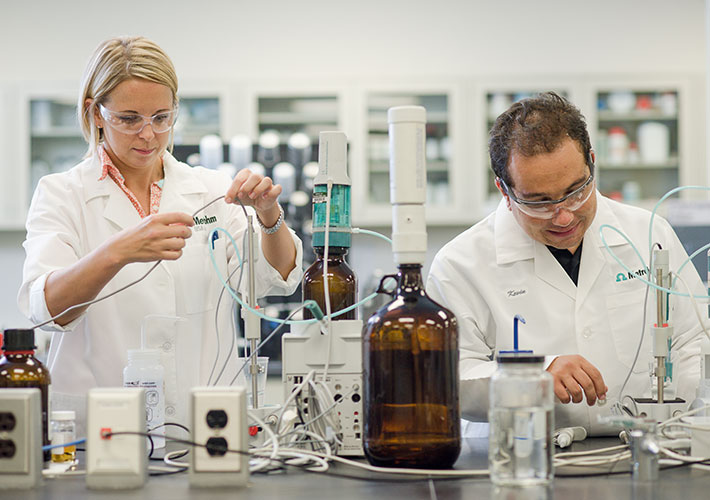
Collaborating to Solve Industry Problems
Metrohm was founded in 1943 in Herisau, Switzerland, and operates in more than 80 countries with over 2,000 employees globally. We manufacture high precision titration, ion chromatography, spectroscopy, and electrochemistry instruments that are used in the laboratory and on the process line.
The largest subsidiary of the Metrohm Group, Metrohm USA has been working with ASTM International on the development of new methods and standards since the 1970s. Back when our U.S. headquarters were located in Long Island, New York, our applications team supplied both titration equipment and expertise for the ever-evolving ASTM standard test for total acid number of petroleum products (D664).
Metrohm has collaborated with other stakeholders in ASTM International technical committees to develop and publish consistent, reliable, and predictable ASTM methods that provide the basis for greater safety and the equitable commerce of many different products. We are actively involved in numerous committees that touch many industries, from environmental to refining, with the largest contributions made in committees on petroleum products, liquid fuels, and lubricants (D02); gaseous fuels (D03); aromatic, industrial, specialty, and related chemicals (D16); and water (D19).
BEYOND ANNUAL MEETINGS
Metrohm understands the importance of innovation in all areas of science. Working with our customers and industry partners to develop and update test methods that incorporate the latest technologies is the passion behind our time dedicated to ASTM, especially when we consider the potential impact of our work around the globe.
With close to 10 employees active as ASTM International members at all times, Metrohm staff have served in a variety of roles on committees, from secretary and chairman to technical contacts and interlaboratory study volunteers.
But the majority of the work Metrohm does that impacts standards occurs outside ASTM International technical committee meetings, working with colleagues in the petroleum and water industries — many of whom are also active in ASTM — to ensure they have the tools they need to accurately test important products that affect public health.
UNIQUELY POSITIONED TO MAKE AN IMPACT
As an analytical instrument manufacturer, we frequently encounter customers who face very similar issues in their daily work. This firsthand knowledge uniquely positions us to identify broader industry problems and work through the ASTM International process to develop clear and concise standards that address those problems. We are honored to participate in ASTM committees with our customers and believe they recognize and appreciate our efforts to address industry challenges together.
Our work with industry partners at ASTM has allowed us to pioneer novel applications, including the use of thermometric titration for the analysis of acid number in petroleum products and the use of combustion ion chromatography for determining total fluorine, chlorine, and sulfur in liquefied petroleum gas.
CASE STUDIES
ASTM’s Committee D02 focuses on developing test methods and product specifications that help ensure the safety and quality of petroleum products, liquid fuels, and lubricants. Metrohm has volunteered members for this committee for close to 50 years.
Controlling Acidic Compounds
We recently helped complete a significant new test method for the acidity of crude oils and petroleum (D8045) that updates and overcomes the limitations of longtime test standard D664.
Acidic compounds lead to corrosion in petroleum refining and transportation infrastructure, so acid number is a critical quality control parameter for crude oil and refined petroleum products. Accurate acid number measurements are crucial to our customers because they influence the commercial value of crude oil and refineries’ profitability. The commercial and corrosion impact of the acid number make it a central measurement for quality control laboratories throughout the industry.
Test method D8045 demonstrates the superiority of thermometric titration for complex petroleum samples as it is significantly faster, requires less maintenance and consumes less reagent. New chemistries used in ASTM D8045 significantly lower the cost per analysis by consuming fewer reagents that require costly disposal.
Controlling Corrosion
Another result of Metrohm’s long-term participation in ASTM is a test method for total fluorine, chlorine, and sulfur in liquid petroleum gas (D7994). Approved and published this year, this standard helps companies in the energy and petrochemical markets to certify products for safe use. There is potential for further applications to extend this method to monitor corrosion in industrial manufacturing equipment. Similar methodology is applicable to the pharmaceutical, electronics, and chemical manufacturing markets for contaminant and corrosion monitoring.
This method is particularly significant to the industry because of the additional information that combustion ion chromatography provides. It is the only analysis that can identify and quantify individual halides in a single test, allowing manufacturers and refiners to pinpoint contamination within their production process and make corrections accordingly.
CONCLUSION
We take pride in our work with ASTM, as we believe that contributing to the development of ASTM standards truly makes a difference to improve product quality and safety while protecting the world we share.
 SN Home
SN Home Archive
Archive Advertisers
Advertisers Masthead
Masthead RateCard
RateCard Subscribe
Subscribe Email Editor
Email Editor